八下 Unit 9 Have you ever been to a museum? 期末复习课件(共19张PPT)
文档属性
| 名称 | 八下 Unit 9 Have you ever been to a museum? 期末复习课件(共19张PPT) | 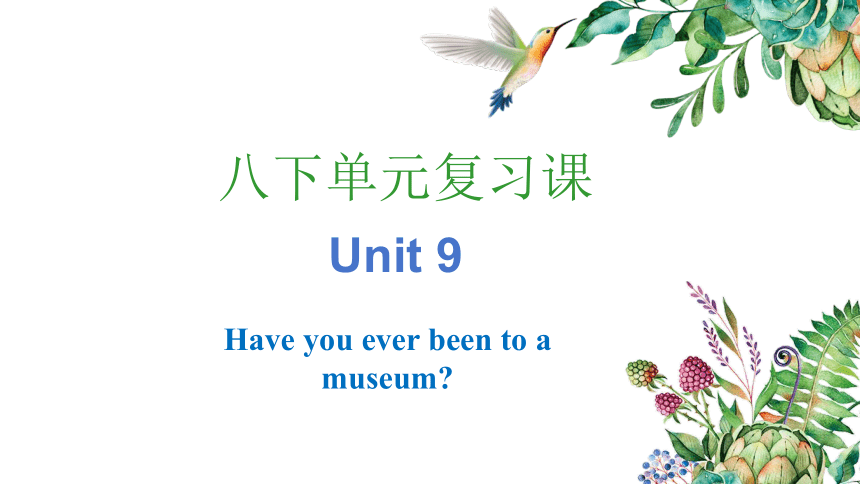 | |
| 格式 | pptx | ||
| 文件大小 | 7.3MB | ||
| 资源类型 | 教案 | ||
| 版本资源 | 人教新目标(Go for it)版 | ||
| 科目 | 英语 | ||
| 更新时间 | 2024-06-13 14:51:00 | ||
图片预览

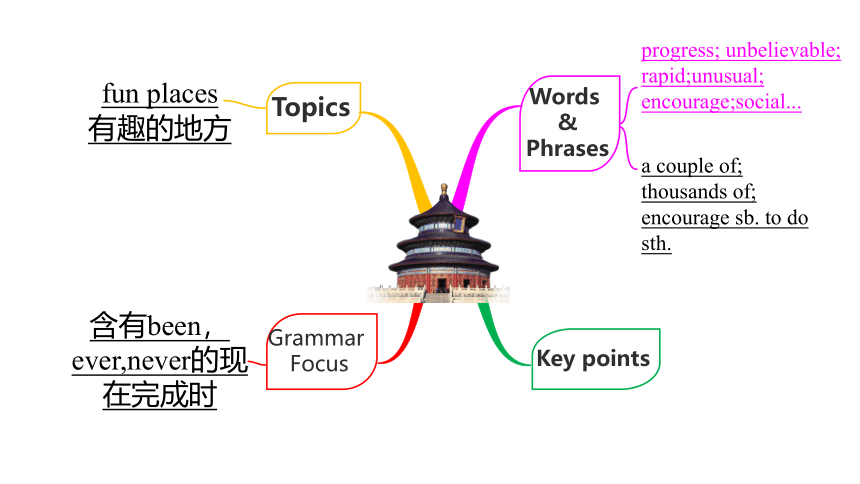
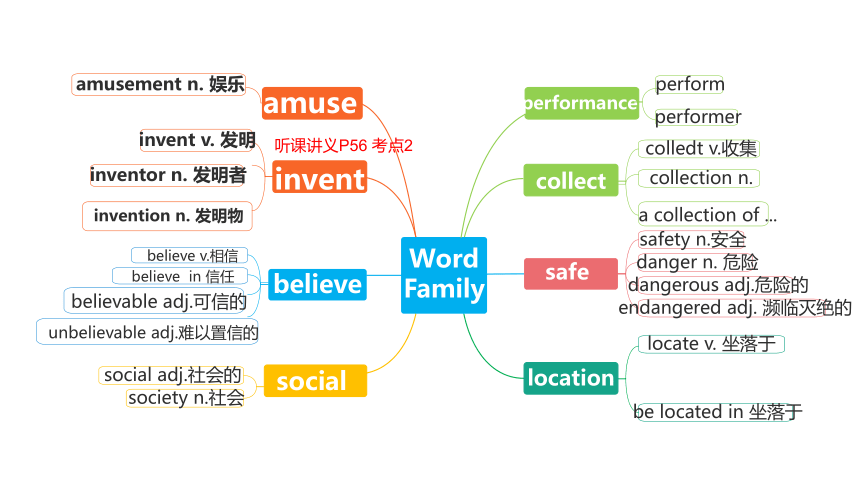

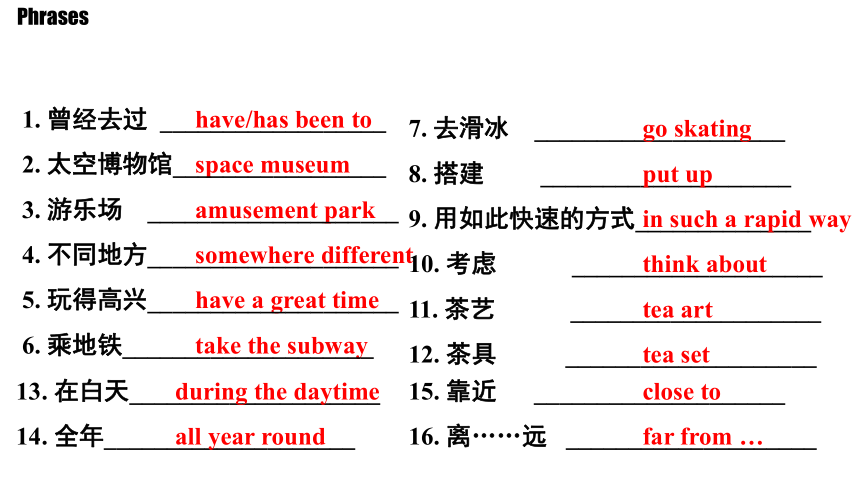
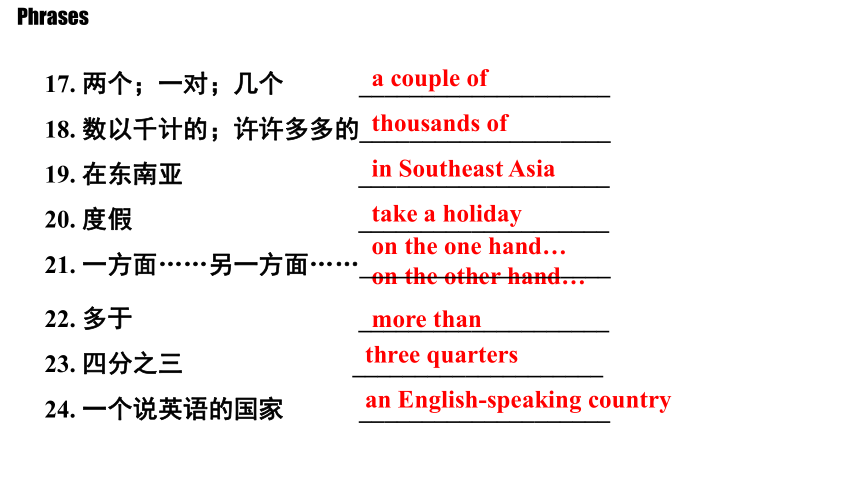
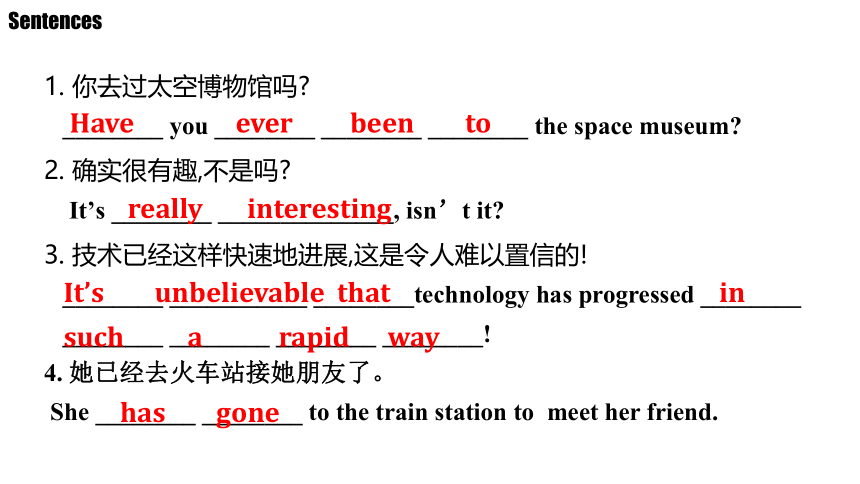
文档简介
(共19张PPT)
Have you ever been to a museum
Unit 9
八下单元复习课
Topics
Words
&
Phrases
Grammar
Focus
Key points
fun places
有趣的地方
progress; unbelievable;
rapid;unusual;
encourage;social...
a couple of; thousands of; encourage sb. to do sth.
含有been,ever,never的现在完成时
Word
Family
collect
location
invent
social
safe
colledt v.收集
collection n.
locate v. 坐落于
be located in 坐落于
invent v. 发明
inventor n. 发明者
invention n. 发明物
social adj.社会的
society n.社会
believe
safety n.安全
danger n. 危险
dangerous adj.危险的
endangered adj. 濒临灭绝的
believe v.相信
believe in 信任
believable adj.可信的
unbelievable adj.难以置信的
a collection of ...
amuse
amusement n. 娱乐
performance
perform
performer
听课讲义P56 考点2
Words Review
Have you ever been to Hangzhou National Tea Musum Have you ever watched the tea art performance It's unbelievable that the unusual tea art performance has progressed so rapidly that it encourages a couple of German social groups to collect thousands of perfect tea sets in three quarters of the provinces in China. They wonder whether these beautiful inventions were invented by ancient inventors in Hangzhou or other provinces.
have/has been to
space museum
amusement park
somewhere different
have a great time
take the subway
1. 曾经去过 __________________
2. 太空博物馆_________________
3. 游乐场 ____________________
4. 不同地方____________________
5. 玩得高兴____________________
6. 乘地铁____________________
7. 去滑冰 ____________________
8. 搭建 ____________________
9. 用如此快速的方式______________
10. 考虑 ____________________
11. 茶艺 ____________________
12. 茶具 ____________________
go skating
put up
in such a rapid way
think about
tea art
tea set
13. 在白天____________________
14. 全年____________________
15. 靠近 ____________________
16. 离……远 ____________________
during the daytime
all year round
close to
far from …
Phrases
a couple of
thousands of
in Southeast Asia
take a holiday
on the one hand…
on the other hand…
more than
17. 两个;一对;几个 ____________________
18. 数以千计的;许许多多的____________________
19. 在东南亚 ____________________
20. 度假 ____________________
21. 一方面……另一方面……____________________
22. 多于 ____________________
23. 四分之三 ____________________
24. 一个说英语的国家 ____________________
three quarters
an English-speaking country
Phrases
1. 你去过太空博物馆吗
________ you ________ ________ ________ the space museum
2. 确实很有趣,不是吗
It’s ________ ______________, isn’t it
3. 技术已经这样快速地进展,这是令人难以置信的!
________ ___________ ________technology has progressed ________
________ ________ ________ ________!
4. 她已经去火车站接她朋友了。
She ________ ________ to the train station to meet her friend.
has gone
Sentences
Have ever been to
really interesting
It’s unbelievable that in
such a rapid way
5. 一方面,这里四分之三的人口是中国人,因此你在很多时间里完全可以说普通话。
______ ______ ______ ______, _______ _______ _______ _______
_______the population _______Chinese , so you can simply speak Putonghua a lot of the time.
5. 天黑的时候去动物园也许显得怪怪的。
________might ________ ________to go to a zoo when it’s dark.
6.你可以选择你喜欢的任何时间来这儿。
You can choose to somehere _________ _______ _____.
are
Sentences
On the one hand more than three quarters of
It seem strange
whenever you like
单元语法点回顾
have been to 与have gone to的区别
have/has been to 表示“曾经去过某地”,暗含现在已不在那里了。后可接次数,如 once, twice, three times 等,表示“去过某地几次”,也可和 just,never,ever等连用。 My sister has been to Dalian twice. 我姐姐去过大连两次。
Have you ever been to the West Lake 你曾经去过西湖吗
have/has gone to 表示“去某地了”,暗含说话时该人不在现场。 — Where is Jim 吉姆在哪里 — He has gone to England.他去英国了。 (尚未回来)
① ever 的含义及用法
ever 作副词,意为“曾经”,常用于现在完成时的否定句和疑问句中,位于助动词 have/has 之后、过去分词之前。
你曾见过像它这样的东西吗
Have you ever seen anything like it
我觉得我以前从未到过这里。
I don't think I have ever been here before.
一、现在完成时中的 ever 和 never
现在完成时(二)
② never 的含义及用法
never 作副词,意为“从不;从未”,常用于现在完成时中,表示否定含义,位于助动词 have/has 之后、过去分词之前。
她从未去过三亚。
She has never been to Sanya.
我之前从未帮助过别人。
I have never helped others before.
一、现在完成时中的 ever 和 never
注意:有 ever, never此类副词时,常强调动作完成, 不强调动作的持续
-Have you ever been to the Great Wall 你曾经去过长城吗
-No, I have never been to the Great Wall. 不,我从未去过长城。
just(刚刚),before(以前;之前),so far(到目前为止)也可以用于现在完成时,谈论刚刚发生的动作或者过去的经历。
现在完成时的标志词还有:
Have you helped others before?你以前帮助过别人吗?
I have just helped a little kid. 我刚刚帮助了一个小孩。
注意区别 just 和 just now ,两者都表示“刚刚”时,just用于完成时, just now 用于一般过去时
◆ How to write a travelogue
travelogue
transportation
location
food
people
places to visit
feeling
weather
Writing Instructions
本单元要求学生用现在完成时谈论自己曾经去过的地方。在写这类文章时,可先介绍去过的一个地方,然后具体描述该地方,最后谈一谈自己去该地方的感受。要注意语气委婉,内容合理,行文流畅、完整。
审题 体裁 话题
时态 人称
段落布局 引出话题
对该地方进行描述
表达感受
说明文
介绍曾经去过的地方
现在完成时和一般过去时
第一人称
Have you ever been to …
If you go to …, you can …
You should also …
There are many things you can…
Have you ever seen …
One great thing about … is that …
No matter which … you choose, there will always be …
Writing guide
Have you ever been to … 你曾去过……吗?
If you go to …, you can … 假如你去……,你可以……
You should also … 你也应该……
There are many things you can… 你有许多事可以……
Have you ever seen … 你曾见过……吗?
One great thing about … is that … 关于……有一件很棒的事是……
No matter which … you choose, there will always be … 无论你选哪一个……,总是会有……。
Sentence patterns
假如你是吉姆,去年暑假你和父母乘飞机去海南度假了。请根据下表以“A Wonderful Trip to Hainan”为题,写一篇80 词左右的短文。
Location Southeast China
Way by plane
Weather warm
Wonderful places Tianya Haijiao, Wanquan River
Activities swimming, fishing, diving, lying
on the beach
Food seafood
… …
书面表达
A Wonderful Trip to Hainan
Have you ever been to Hainan For thousands of tourists from China, this island in Southeast China is a wonderful place to take a holiday. Last summer I had a wonderful trip to Hainan with my parents. We went there by plane. The weather was warm. We visited many interesting places, such as Tianya Haijiao, which means “the edge of the sky and the rim of the sea”, and Wanquan River. We went swimming, fishing and diving there. We also enjoyed the delicious seafood there. The long white beaches were very beautiful. I lay on the beach to relax myself quietly. We had a great time.
Though we were tired, we all felt very happy.
Thank you~
Have you ever been to a museum
Unit 9
八下单元复习课
Topics
Words
&
Phrases
Grammar
Focus
Key points
fun places
有趣的地方
progress; unbelievable;
rapid;unusual;
encourage;social...
a couple of; thousands of; encourage sb. to do sth.
含有been,ever,never的现在完成时
Word
Family
collect
location
invent
social
safe
colledt v.收集
collection n.
locate v. 坐落于
be located in 坐落于
invent v. 发明
inventor n. 发明者
invention n. 发明物
social adj.社会的
society n.社会
believe
safety n.安全
danger n. 危险
dangerous adj.危险的
endangered adj. 濒临灭绝的
believe v.相信
believe in 信任
believable adj.可信的
unbelievable adj.难以置信的
a collection of ...
amuse
amusement n. 娱乐
performance
perform
performer
听课讲义P56 考点2
Words Review
Have you ever been to Hangzhou National Tea Musum Have you ever watched the tea art performance It's unbelievable that the unusual tea art performance has progressed so rapidly that it encourages a couple of German social groups to collect thousands of perfect tea sets in three quarters of the provinces in China. They wonder whether these beautiful inventions were invented by ancient inventors in Hangzhou or other provinces.
have/has been to
space museum
amusement park
somewhere different
have a great time
take the subway
1. 曾经去过 __________________
2. 太空博物馆_________________
3. 游乐场 ____________________
4. 不同地方____________________
5. 玩得高兴____________________
6. 乘地铁____________________
7. 去滑冰 ____________________
8. 搭建 ____________________
9. 用如此快速的方式______________
10. 考虑 ____________________
11. 茶艺 ____________________
12. 茶具 ____________________
go skating
put up
in such a rapid way
think about
tea art
tea set
13. 在白天____________________
14. 全年____________________
15. 靠近 ____________________
16. 离……远 ____________________
during the daytime
all year round
close to
far from …
Phrases
a couple of
thousands of
in Southeast Asia
take a holiday
on the one hand…
on the other hand…
more than
17. 两个;一对;几个 ____________________
18. 数以千计的;许许多多的____________________
19. 在东南亚 ____________________
20. 度假 ____________________
21. 一方面……另一方面……____________________
22. 多于 ____________________
23. 四分之三 ____________________
24. 一个说英语的国家 ____________________
three quarters
an English-speaking country
Phrases
1. 你去过太空博物馆吗
________ you ________ ________ ________ the space museum
2. 确实很有趣,不是吗
It’s ________ ______________, isn’t it
3. 技术已经这样快速地进展,这是令人难以置信的!
________ ___________ ________technology has progressed ________
________ ________ ________ ________!
4. 她已经去火车站接她朋友了。
She ________ ________ to the train station to meet her friend.
has gone
Sentences
Have ever been to
really interesting
It’s unbelievable that in
such a rapid way
5. 一方面,这里四分之三的人口是中国人,因此你在很多时间里完全可以说普通话。
______ ______ ______ ______, _______ _______ _______ _______
_______the population _______Chinese , so you can simply speak Putonghua a lot of the time.
5. 天黑的时候去动物园也许显得怪怪的。
________might ________ ________to go to a zoo when it’s dark.
6.你可以选择你喜欢的任何时间来这儿。
You can choose to somehere _________ _______ _____.
are
Sentences
On the one hand more than three quarters of
It seem strange
whenever you like
单元语法点回顾
have been to 与have gone to的区别
have/has been to 表示“曾经去过某地”,暗含现在已不在那里了。后可接次数,如 once, twice, three times 等,表示“去过某地几次”,也可和 just,never,ever等连用。 My sister has been to Dalian twice. 我姐姐去过大连两次。
Have you ever been to the West Lake 你曾经去过西湖吗
have/has gone to 表示“去某地了”,暗含说话时该人不在现场。 — Where is Jim 吉姆在哪里 — He has gone to England.他去英国了。 (尚未回来)
① ever 的含义及用法
ever 作副词,意为“曾经”,常用于现在完成时的否定句和疑问句中,位于助动词 have/has 之后、过去分词之前。
你曾见过像它这样的东西吗
Have you ever seen anything like it
我觉得我以前从未到过这里。
I don't think I have ever been here before.
一、现在完成时中的 ever 和 never
现在完成时(二)
② never 的含义及用法
never 作副词,意为“从不;从未”,常用于现在完成时中,表示否定含义,位于助动词 have/has 之后、过去分词之前。
她从未去过三亚。
She has never been to Sanya.
我之前从未帮助过别人。
I have never helped others before.
一、现在完成时中的 ever 和 never
注意:有 ever, never此类副词时,常强调动作完成, 不强调动作的持续
-Have you ever been to the Great Wall 你曾经去过长城吗
-No, I have never been to the Great Wall. 不,我从未去过长城。
just(刚刚),before(以前;之前),so far(到目前为止)也可以用于现在完成时,谈论刚刚发生的动作或者过去的经历。
现在完成时的标志词还有:
Have you helped others before?你以前帮助过别人吗?
I have just helped a little kid. 我刚刚帮助了一个小孩。
注意区别 just 和 just now ,两者都表示“刚刚”时,just用于完成时, just now 用于一般过去时
◆ How to write a travelogue
travelogue
transportation
location
food
people
places to visit
feeling
weather
Writing Instructions
本单元要求学生用现在完成时谈论自己曾经去过的地方。在写这类文章时,可先介绍去过的一个地方,然后具体描述该地方,最后谈一谈自己去该地方的感受。要注意语气委婉,内容合理,行文流畅、完整。
审题 体裁 话题
时态 人称
段落布局 引出话题
对该地方进行描述
表达感受
说明文
介绍曾经去过的地方
现在完成时和一般过去时
第一人称
Have you ever been to …
If you go to …, you can …
You should also …
There are many things you can…
Have you ever seen …
One great thing about … is that …
No matter which … you choose, there will always be …
Writing guide
Have you ever been to … 你曾去过……吗?
If you go to …, you can … 假如你去……,你可以……
You should also … 你也应该……
There are many things you can… 你有许多事可以……
Have you ever seen … 你曾见过……吗?
One great thing about … is that … 关于……有一件很棒的事是……
No matter which … you choose, there will always be … 无论你选哪一个……,总是会有……。
Sentence patterns
假如你是吉姆,去年暑假你和父母乘飞机去海南度假了。请根据下表以“A Wonderful Trip to Hainan”为题,写一篇80 词左右的短文。
Location Southeast China
Way by plane
Weather warm
Wonderful places Tianya Haijiao, Wanquan River
Activities swimming, fishing, diving, lying
on the beach
Food seafood
… …
书面表达
A Wonderful Trip to Hainan
Have you ever been to Hainan For thousands of tourists from China, this island in Southeast China is a wonderful place to take a holiday. Last summer I had a wonderful trip to Hainan with my parents. We went there by plane. The weather was warm. We visited many interesting places, such as Tianya Haijiao, which means “the edge of the sky and the rim of the sea”, and Wanquan River. We went swimming, fishing and diving there. We also enjoyed the delicious seafood there. The long white beaches were very beautiful. I lay on the beach to relax myself quietly. We had a great time.
Though we were tired, we all felt very happy.
Thank you~
同课章节目录
- Unit 1 What's the matter?
- Section A
- Section B
- Unit 2 I'll help to clean up the city parks.
- Section A
- Section B
- Unit 3 Could you please clean your room?
- Section A
- Section B
- Unit 4 Why don't you talk to your parents?
- Section A
- Section B
- Unit 5 What were you doing when the rainstorm came
- Section A
- Section B
- Review of Units 1-5
- Unit 6 An old man tried to move the mountains.
- Section A
- Section B
- Unit 7 What's the highest mountain in the world?
- Section A
- Section B
- Unit 8 Have you read Treasure Island yet?
- Section A
- Section B
- Unit 9 Have you ever been to a museum?
- Section A
- Section B
- Unit 10 I've had this bike for three years.
- Section A
- Section B
